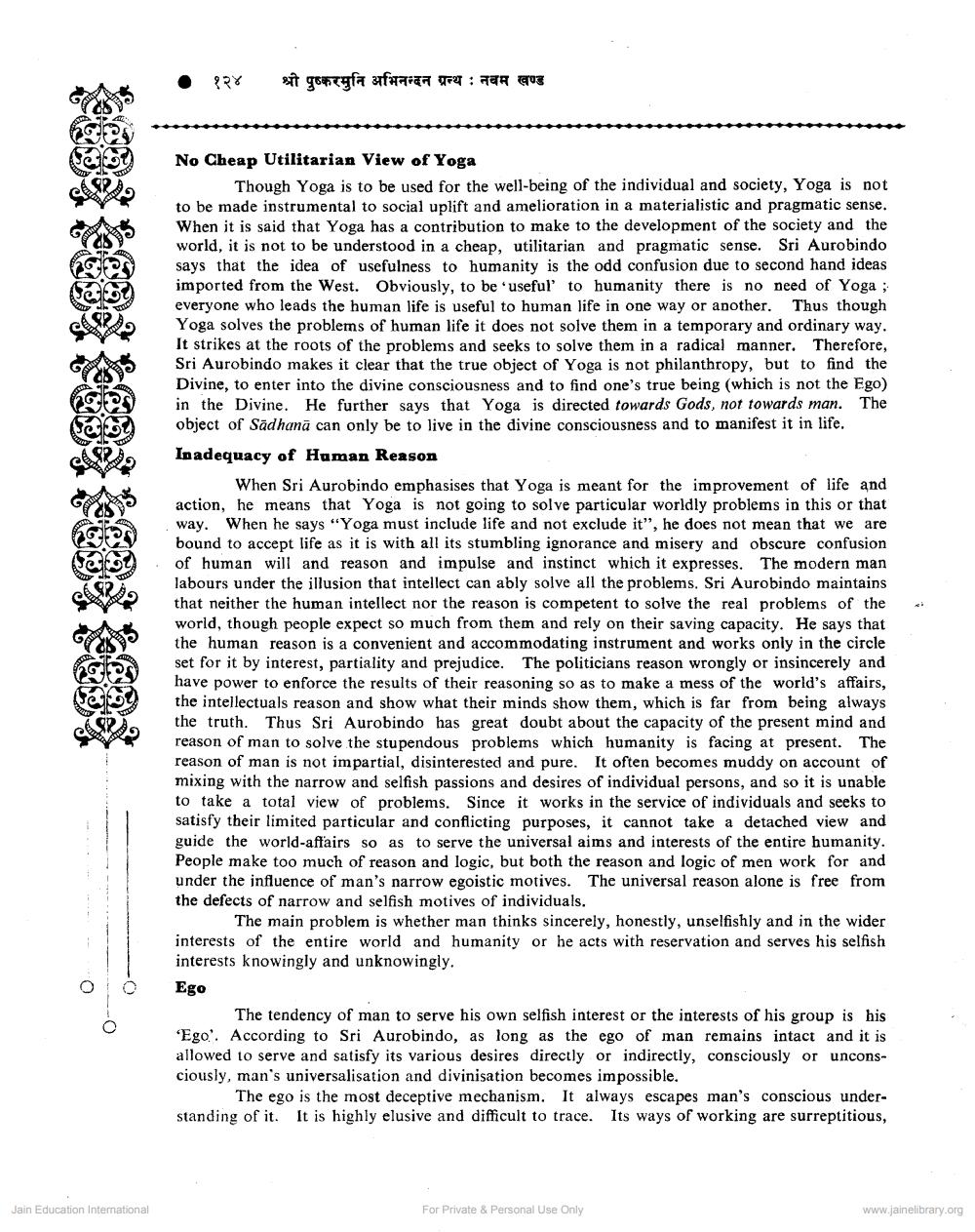Book Title: Integral Yoga Its Nature and Significance Author(s): G N Joshi Publisher: Z_Pushkarmuni_Abhinandan_Granth_012012.pdf View full book textPage 4
________________ . १२४ श्री पुष्करमुनि अभिनन्दन ग्रन्थ : नवम खण्ड 2 No Cheap Utilitarian View of Yoga Though Yoga is to be used for the well-being of the individual and society, Yoga is not to be made instrumental to social uplift and amelioration in a materialistic and pragmatic sense. When it is said that Yoga has a contribution to make to the development of the society and the world, it is not to be understood in a cheap, utilitarian and pragmatic sense. Sri Aurobindo says that the idea of usefulness to humanity is the odd confusion due to second hand ideas imported from the West. Obviously, to be useful to humanity there is no need of Yoga; everyone who leads the human life is useful to human life in one way or another. Thus though Yoga solves the problems of human life it does not solve them in a temporary and ordinary way. It strikes at the roots of the problems and seeks to solve them in a radical manner. Therefore, Sri Aurobindo makes it clear that the true object of Yoga is not philanthropy, but to find the Divine, to enter into the divine consciousness and to find one's true being (which is not the Ego) in the Divine. He further says that Yoga is directed towards Gods, not towards man. The object of Sadhanā can only be to live in the divine consciousness and to manifest it in life. Inadequacy of Human Reason When Sri Aurobindo emphasises that Yoga is meant for the improvement of life and action, he means that Yoga is not going to solve particular worldly problems in this or that way. When he says "Yoga must include life and not exclude it", he does not mean that we are bound to accept life as it is with all its stumbling ignorance and misery and obscure confusion of human will and reason and impulse and instinct which it expresses. The modern man labours under the illusion that intellect can ably solve all the problems. Sri Aurobindo maintains that neither the human intellect nor the reason is competent to solve the real problems of the world, though people expect so much from them and rely on their saving capacity. He says that the human reason is a convenient and accommodating instrument and works only in the circle set for it by interest, partiality and prejudice. The politicians reason wrongly or insincerely and have power to enforce the results of their reasoning so as to make a mess of the world's affairs, the intellectuals reason and show what their minds show them, which is far from being always the truth. Thus Sri Aurobindo has great doubt about the capacity of the present mind and reason of man to solve the stupendous problems which humanity is facing at present. The reason of man is not impartial, disinterested and pure. It often becomes muddy on account of mixing with the narrow and selfish passions and desires of individual persons, and so it is unable to take a total view of problems. Since it works in the service of individuals and seeks to satisfy their limited particular and conflicting purposes, it cannot take a detached view and guide the world-affairs so as to serve the universal aims and interests of the entire humanity. People make too much of reason and logic, but both the reason and logic of men work for and under the influence of man's narrow egoistic motives. The universal reason alone is free from the defects of narrow and selfish motives of individuals. The main problem is whether man thinks sincerely, honestly, unselfishly and in the wider interests of the entire world and humanity or he acts with reservation and serves his selfish interests knowingly and unknowingly. Ego The tendency of man to serve his own selfish interest or the interests of his group is his 'Ego'. According to Sri Aurobindo, as long as the ego of man remains intact and it is allowed to serve and satisfy its various desires directly or indirectly, consciously or unconsciously, man's universalisation and divinisation becomes impossible. The ego is the most deceptive mechanism. It always escapes man's conscious understanding of it. It is highly elusive and difficult to trace. Its ways of working are surreptitious, O Jain Education International For Private & Personal Use Only www.jainelibrary.orgPage Navigation
1 2 3 4 5 6 7 8 9 10 11 12 13 14 15 16
